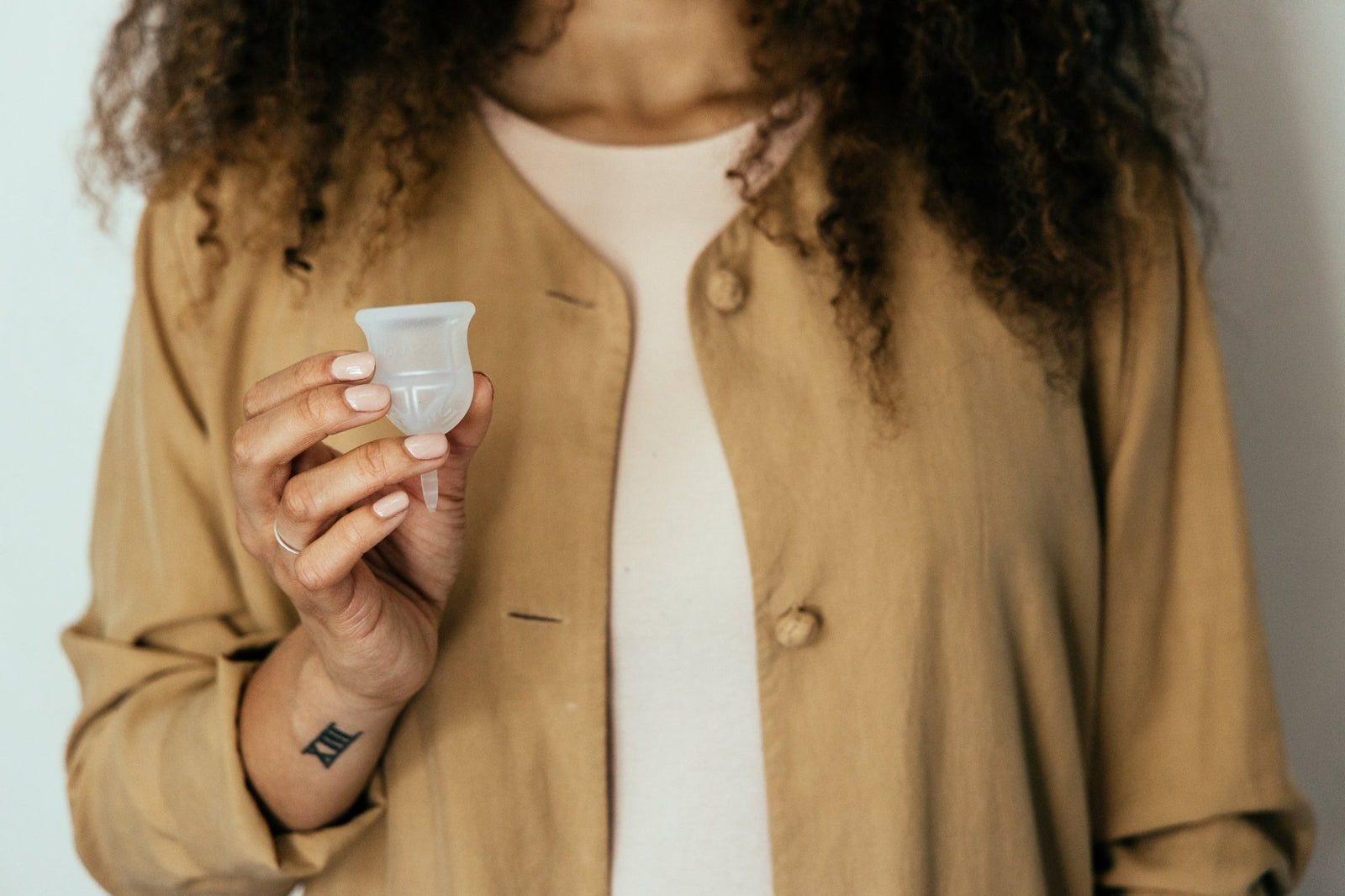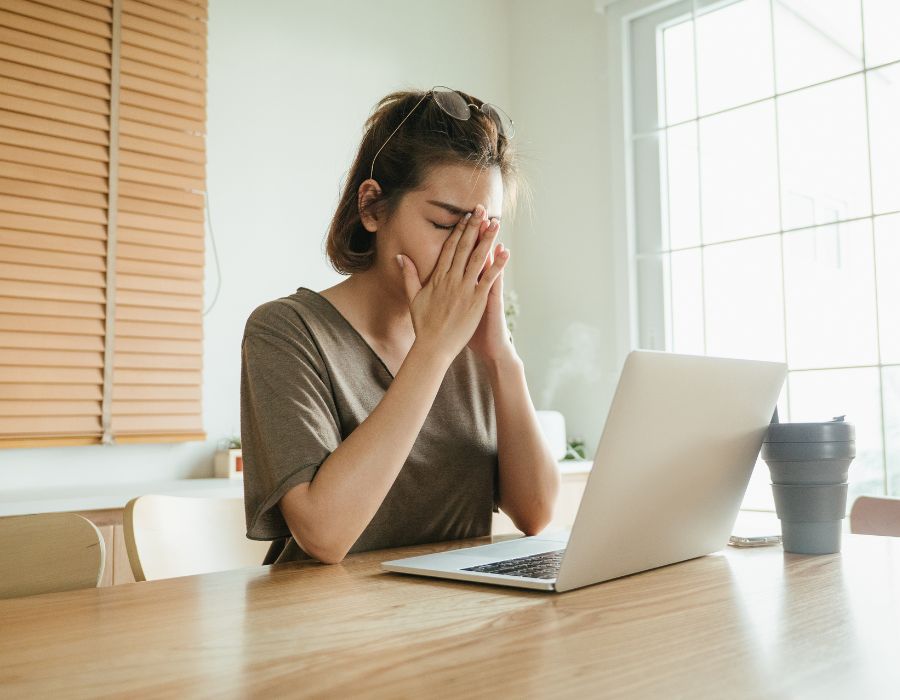The best tips for keeping bloating and cramps at bay for a more comfortable period.
Let’s be honest, period bloating sucks - add cramps on top of that, and now the struggle is real. Premenstrual syndrome (PMS) symptoms can occur 1-2 weeks before your period, and may even last throughout your period. As many as 70% of females experience bloating during their periods, and more than 80% of females experience cramping.
Don’t worry, you are not alone! You can manage both period bloating and cramps through simple lifestyle changes that include diet, exercise, supplements, stress-relieving therapies, and self-care. Don’t let the discomfort ruin your week, check out these tips and tricks!
How to Manage Period Bloating
Have you ever eaten a big meal and next thing you know, it looks and feels like you have a food baby? Bloating is that uncomfortable, swollen feeling in your stomach. It feels somewhat like a balloon blowing up inside your tummy.
Why does this happen? When the gastrointestinal tract (GI)is filled with excess gas and air, that's when bloating occurs. While eating and drinking is the most common cause, swallowing air, constipation, and some medical conditions like lactose intolerance, celiac disease and Crohn's can be to blame. Not only does it feel uncomfortable and sometimes painful, but the “food baby” look can also be embarrassing.
To fight the bloat, here are some things you can do.
Eat Better - Improve Your Eating Habits

Photo by Yan Krukov
A big bowl of pasta with a side of garlic bread sounds tempting, right? Yes, it does, but it’s important to note that certain foods may worsen your bloating. Some common foods and drinks that cause bloating include beans, wheat products, dairy products, and beer to name a few. These foods are often slow-to-digest, which leads directly to gas build-up and bloating. So what foods and drinks should you be consuming to help with bloating? Check out the list below.
What To Eat
- Grains - Brown Rice, Quinoa, Oats;
- High Fiber Fruits - Raspberries, Mangos, Pineapples;
- Vegetables - Asparagus, Celery, Tomatoes;
- Drinks & Beverages - Green/Peppermint Tea, Kombucha, Coconut Water;
Certain eating habits that might lead to excess gas build-up and bloating include eating too fast, not chewing food properly, and eating late at night. To be honest, I struggle with all of these habits myself. I tend to eat with my eyes first, and the next thing you know, the entire pizza is gone.
Here are some tips:
#1: When it’s time to eat, put away all your electronics and focus on the food in front of you.
#2: Use all your senses, and eat slowly and early in the day if you can. Life moves fast, but eating shouldn’t be a race! Take this time to unwind and relax.
What Not To Eat
You just finished eating, and now you feel gassy and bloated (ugh). I hate that feeling too! Bloat is the build-up of gas in the abdomen, it can be uncomfortable and sometimes painful. On the bright side, bloated stomachs are often temporary. It is likely gained water weight or digestive issues that cause a distended belly.
There are so many different reasons why you’re experiencing bloating. The most common include a diet high in sodium, sensitivity to certain foods, increased fiber in your diet, and lastly, you may be experiencing a food intolerance.
Avoid These Bloat-Inducing Foods & Drinks:
- Dairy Products - Cheese, Yogurt, Milk;
- Wheat Products - Bread, Pasta, Baked Goods;
- Cruciferous Vegetables/Beans - Broccoli, Cauliflower, Cabbage;
- Carbonated Beverages - Alcohol, Soft Drinks, Sparkling Water;
Can you imagine never having cheese, pasta, and alcohol ever again? Yeah, that sounds like a nightmare. There is no need to completely eliminate these foods, just enjoy them in moderation.
Consult with your physician if you have any questions or concerns, and before beginning any diet or nutrition plan.
Beat the Bloat - Tip + Tricks

Eating & Chewing Slowly
One of the most common reasons for bloating is eating too fast, and not chewing food properly. Eating too fast leads to more air being swallowed, which results in bloating and gas in the abdomen. Try to slow down during meal time, and practice mindfully eating.
Exercise Regularly
Research has proven that moderate exercise provides relief to PMS symptoms, including bloating. You don’t need to go out and run a marathon, around 2.5 hours of moderate exercise every week is sufficient. Examples of moderate-intensity exercise include brisk walking, bicycling, jogging, swimming, and even sex (wink-wink).
Sleep
Sleep is an important part of overall health. Lack of sleep can increase stress, which affects the gut. With that being said, sleep and gut health are definitely interconnected. Not getting enough sleep at night can throw your hormones off balance, and the stress hormone, cortisol, can rise. Staying up too late, and tossing and turning all night can take a toll on your physical and mental health. Overall, you should aim for 7 - 9 hoursof sleep every night.
Hydrate
Did you know that about 60% of your body is made up of water? Water plays many important roles in the body. From regulating our body temperature to protecting organs and tissues, drinking water helps reduce bloat by flushing out the digestive tract. Since high-salt foods are known to be the main culprit when it comes to bloating, drinking water will rid your body of all the excess sodium. To avoid dehydration, most people will need about four to six cups of water each day.
How to Manage Period Cramps

Photo by Peter Olexa
Let’s talk about period cramps. You get them, I get them, and the majority of women get them. They suck, there is no sugar coating here!
Menstrual cramps are caused by hormone-like chemicals called prostaglandins that are influenced by your estrogen levels and may induce pain and inflammation. There are several great cramp relief methods to manage menstrual cramps. Each of these may lead to one or more of the following:
- Reduction in Inflammation
- Blocking Pain
- Limiting Prostaglandin Production
- Treating an Underlying Condition (Endometriosis,Uterine Fibroids)
- Increasing Uterine Blood Flow
Here are several tricks you can use to relief painful menstrual cramps.
Healthy Diet
The food you put into your body plays an important role in how you feel, so choosing the right food during your period can help you beat those cramps. A diet that is high in fiber, full of vegetables and fruits, and low in sodium and sugar is the way to go. Not a fan of salads? Try toppings like sweet fruit and different types of protein. Some foods may seem too bland, but there are so many different ways to introduce more flavor and variety to your everyday meals. From using fresh herbs to flavorful spices, the combinations are endless!
Does this mean that you need to permanently eliminate all of your favorite foods? Nope! Just enjoy them in moderation. Not just the food that we eat, but staying hydrated will help reduce cramps as well. If plain water is too boring, you can incorporate fruit-infused water and teas into your everyday routine.
Plants and herbs - Period Cramp Cream
Several natural plant-based products, like this Recovery Mode Period Cramp Cream that includes arnica and other powerful ancient herbs, can help treat menstrual pain and soothe cramps. Most of them are age-old plants and herbs that have helped women get relief from menstrual cramps for centuries. Some of the natural ingredients to look for in tea or other products that you can try (if you are up for experimenting) include fennel, turmeric, ginger, cinnamon, dill, chamomile, agnus-castus, and pycnogenol (French maritime pine bark extract).
Dietary Supplements
There has been much research on the effectiveness of certain minerals and vitamins in reducing period cramps. It was found that magnesium can be great for this purpose. There is some evidence that zinc can also play a similar role in menstruating women. Cramps may also be eased by Vitamin B1, Vitamin E, high doses of Vitamin D, and fish oil.
Exercise
Exercise helps reduce menstrual cramps because it releases endorphins in your brain, which are chemicals responsible for promoting well-being.
It’s completely safe for you to exercise during your period. Moderate exercises that get your heart rate up are an easy remedy for menstrual cramps. You can enjoy swimming, or jogging if you feel like it. Perhaps a lighter form of exercise such as tai chi or yoga is your thing. Someyoga poses that can help you feel better during your period include the staff pose, bridge, and bound angel. Regardless of if you are a beginner or advanced, check out Youtube videos and online blog posts for tips and tricks.
Heat
Heat enables your muscles to relax, and this is why you can relieve menstrual cramps by applying heat to your abdomen. You can use a heating pad, hot water bottle, or heat wrap, all of which may be bought at a drugstore or online. If you don’t have any of these, you can use a warm towel, and take a nice hot shower or bath.
Massage
Try massaging your abdomen using massage creams that contain essential oils like lavender, clary sage, and marjoram (known for pain relief and soothing dysmenorrhea). This can enhance your blood flow and bring relief, even if you massage for about 5 minutes each day.
Chinese Herbal Medicine
Between 20% to 25% of women don’t find their cramps relieved when they use traditional methods or medications for primary dysmenorrhea (cramps caused by periods), or are unable to use them because they can’t tolerate conventional treatments. If you are in the same boat, you may try Chinese herbal medicine that has been proven effective for reducing PMS symptoms, including pain, along with decreasing the need for pain medication. You may find these herbal medicines in your local Asian market.
Medication Relief
If you have tried the interventions and home remedies mentioned above but are still experiencing menstrual cramps that are severe enough to disrupt your daily life, you should visit your doctor. Your hormone levels will be checked, and your physician may prescribe medications such as birth control pills to treat severe period cramps. Be sure to discuss all your symptoms and provide a clear medical history so that the treatment can be tailored for you.
In the end, remember that your body is going through a lot when you are on your period, so be sure to practice some self-care and self-love during this time. Your period may seem like a huge inconvenience, but the female body is extremely powerful and unlike no other.
Consult with your physician if you have any questions or concerns, and before beginning any diet, training or nutrition plan.
Periods are much easier to manage with the right menstrual hygiene products.
VOXAPOD menstrual cups make managing periods a piece of cake because they are comfortable, easy to use, and provide 12 hours of leak-proof and overnight protection.
They are also reusable, which is great for the environment (and your pocket!). If that wasn’t enough, with every purchase of this menstrual cup, you can also contribute to eradicating period poverty (lack of adequate menstrual hygiene products) all over the world.

Allysa Truong hails from Oregon where she studied marketing and enjoys spending time with loved ones in the kitchen. She is a self-care devotee with favorite hobbies including long showers, napping, curling up to a good RomCom, or spending time baking comfort food, especially Thai and other Asian cuisines. Her period self-care tip for others is to prioritize your mental health.




Claudia Jones
June 05, 2025
PROMPTTECHRECOVERY is an ideal recovery firm. They proved so handy and professional with their service to me during my stolen bitcoin recovery process from the hands of fake celebrity/investment scammers. The whole process lasted about 72 hours, and my funds were found and returned to me. Do not relent to reach out to them via the channels- WhatsApp +1 (484) 540 – 0785, Telegram: prompttechrecovery, also on Email: 'promppttechrecoverygmail. com, if you or your loved ones ever find themselves in such situations. The team of experts works round the clock to ensure success in recovering and tracing the scammer involved.